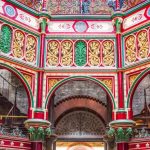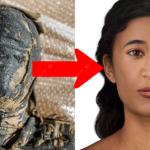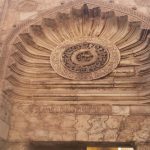Dionysus Mounted on a Panther: Floor Mosaic in the House of the Masks, Delos, dating from around 120–80 BC

In the ancient Greek island of Delos, nestled in the heart of the Cyclades archipelago, lies the House of the Masks—a site steeped in history and shrouded in myth. Among the treasures uncovered within its walls is a remarkable floor mosaic depicting Dionysus, the god of wine and revelry, astride a majestic panther. Crafted around 120—80 BC, this exquisite work of art offers a captivating glimpse into the world of ancient Greek religion, symbolism, and artistic expression.
The mosaic, found in the House of the Masks on the island of Delos, serves as a testament to the enduring popularity and significance of Dionysus in ancient Greek culture. Known as the god of wine, fertility, and ecstasy, Dionysus held a prominent place in the pantheon of Olympian deities, revered by mortals and immortals alike. Depicted in the mosaic as a youthful figure with flowing locks and a serene expression, Dionysus exudes an aura of divine majesty and power, symbolizing the intoxicating allure of wine and the revelry that accompanies it.

Central to the composition of the mosaic is Dionysus’ mount—a magnificent panther, its sleek form captured in intricate detail. In ancient Greek mythology, the panther was often associated with Dionysus, symbolizing his wild and untamed nature, as well as his ability to traverse the boundaries between the human and divine realms. As Dionysus rides triumphantly atop the panther, his divine presence is magnified, elevating him to the status of a celestial being.
Surrounding Dionysus and his panther are a series of intricate motifs and symbols, each laden with meaning and significance. Vines and grape clusters intertwine with ivy leaves and fig branches, evoking the fecundity of the natural world and the abundance of the earth. These motifs, commonly associated with Dionysus and his cult, serve to reinforce the god’s role as a patron of fertility and agricultural abundance, as well as a bringer of joy and liberation.
The House of the Masks, where the mosaic was discovered, is itself a testament to the wealth and sophistication of ancient Delian society. Named for the theatrical masks depicted in its decorative motifs, the house served as a luxurious residence for its inhabitants, adorned with elaborate frescoes, marble sculptures, and other works of art. The discovery of the Dionysus mosaic within its confines speaks to the importance of religion and spirituality in the lives of ancient Greeks, who sought to honor and appease the gods through acts of devotion and worship.

The Dionysus mosaic from the House of the Masks offers valuable insights into the religious beliefs, artistic techniques, and cultural practices of ancient Greek society. Its exquisite craftsmanship and rich symbolism provide a window into the world of Dionysian worship, where wine flowed freely, music filled the air, and ecstatic revelry abounded. As visitors gaze upon the mosaic, they are transported back in time to an era of myth and magic, where gods walked among mortals and the boundaries between the earthly and divine realms blurred.
Today, the Dionysus mosaic stands as a testament to the enduring legacy of ancient Greek civilization, preserving the memory of Dionysus and his cult for future generations to admire and appreciate. Its discovery on the island of Delos serves as a reminder of the island’s importance as a religious and cultural center in antiquity, attracting pilgrims and travelers from far and wide in search of divine inspiration and spiritual enlightenment.
In conclusion, the Dionysus mosaic from the House of the Masks in Delos is a masterpiece of ancient Greek art and a testament to the enduring allure of Dionysus, the god of wine and revelry. Crafted around 120—80 BC, this exquisite work of art captures the essence of Dionysian worship, with its lush symbolism, intricate detail, and divine majesty. As visitors marvel at the mosaic, they are transported back in time to an era of myth and magic, where gods and mortals mingled in a symphony of ecstasy and celebration.










